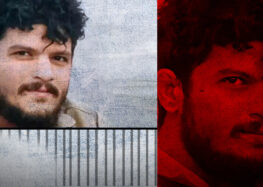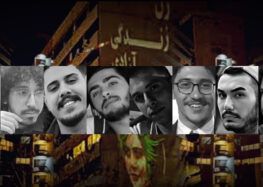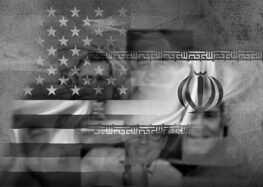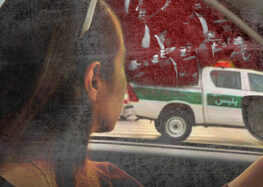Q&A: Nazanin Zaghari-Ratcliffe’s Husband Speaks Out About Dual National’s Imprisonment in Iran
The husband of imprisoned Iranian dual national Nazanin Zaghari-Ratcliffe speaks to CHRI about her case and their lives since she was arrested by the Revolutionary Guards in April 2016.
Nazanin Zaghari-Ratcliffe never imagined she would be arrested and ultimately sentenced to five years in prison when she entered Tehran’s international airport on her way back home to the UK after visiting her parents. But nightmare became reality on April 3, 2016 when the Revolutionary Guards’ Intelligence Organization detained the London-based Iranian-British citizen, her baby in her arms.
Nazanin was denied access to a lawyer for the first 130 days of her detainment, which included extended periods of solitary confinement and repeated interrogations, her husband, Richard Ratcliffe, told the Center for Human Rights in Iran (CHRI) in an interview on September 21, 2017. The British passport of their 22-month-old daughter, Gabriella—whom Nazanin had just finished breastfeeding—was also confiscated and she was placed in the care of her elderly grandparents in Tehran.
“Gabriella has been calling her granny ‘mom’… and that has been very hard for Nazanin,” Richard told CHRI during a trip to New York amid the UN General Assembly. “Having her baby taken away from her has been like having part of her ripped away.”
Three days before her trial, Nazanin, who worked for the charitable arm of the Thomson Reuters Foundation, was allowed to meet with an Iranian lawyer for 30 minutes. She wasn’t allowed to speak for herself or to anyone during the court session, in which she was issued a five-year prison sentence for “national security” charges that Richard says were never specified to Nazanin or the public. Her lawyer was also personally prosecuted for what he had written in her formal defense.
On September 28, the day after she was diagnosed with advanced depression, Nazanin was denied furlough. The temporary leave—typically granted to prisoners in Iran for a variety of familial, holiday, and medical reasons—is routinely denied to political prisoners as a form of additional punishment.
“She still goes up and down, and it’s related to seeing Gabriella or not seeing her,” Richard, whose marriage and fatherhood have been reduced to scant phone calls, told CHRI. “It’s related to hope, of being promised things and seeing them taken away.”
Can you tell us what happened with Nazanin and where her case is at today?
Nazanin was taken in April 2016 while she was on holiday with Gabriella, who was then just before her second birthday. She was taken down to Kamran Prison and later Evin Prison in Tehran and has been held at times in solitary confinement and now in the women’s political ward and is currently still there.
I have been campaigning for her release for almost a year and a half now. This week I’m in New York for the UN General Assembly, to try and meet with different missions and country heads to advocate for Nazanin’s case. We’re saying it’s outrageous that she has been held, that she was just [in Iran] for holiday, and has been kept for secret reasons. We also are saying that Nazanin’s case is not unique; there are a number of other families who had people taken and this is a problem that not only Iran needs to address, but also the rest of the world.
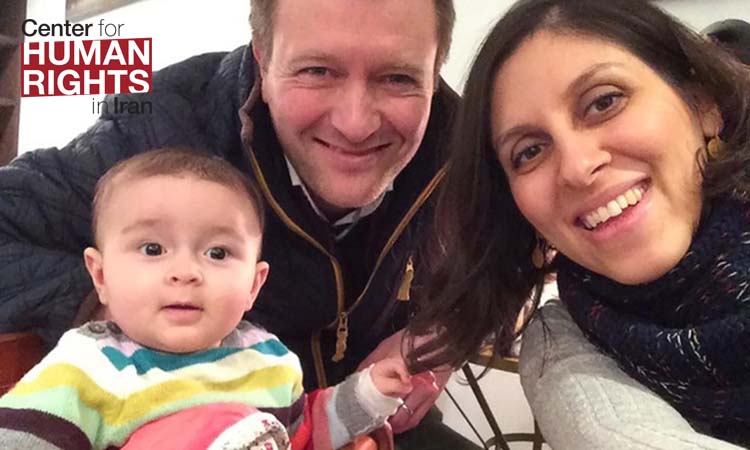
What kind of legal representation has Nazanin had in Iran and has she been fairly served?
Nazanin didn’t have a lawyer for the first 130 days of her detention and was told she didn’t need one at regular points. She was taken to court in August of 2016 and three days before her court case she was allowed to meet her lawyer for half an hour. On the day of the trial, she wasn’t allowed to speak to her lawyer and she wasn’t allowed to speak at all at her trial. Afterwards, Nazanin was allowed to prepare a written defense and to meet with her lawyer—before she was allowed to do that she had to sit blind-folded as her interrogators read her defense and decided whether she was allowed to share it and asked her questions while she was still blind-folded.
After that, her appeal hearing wasn’t set for another three months. Her trial was in August 2016 and the appeal was in January 2017 and her lawyer was personally prosecuted—both times she was sentenced to five years in prison. A separate case against him was also raised. And she had a Supreme Court review, which her lawyer was able to present, but again that failed.
Nazanin’s lawyer was personally prosecuted?
He was prosecuted for “unprofessionalism” in his defense of Nazanin. They had objected to things that were written in the papers. He has not met Nazanin since January 2017. She now also has a second lawyer.
How did the judiciary’s decision to prosecute her first lawyer affect Nazanin’s case?
It sent a clear signal of pressure to him as much as Nazanin having to sit blindfolded while she defended herself did. It’s very clear pressure, and there have been a number of ways that the whole court process has been astounding to look at from the outside. I was amazed that Nazanin wasn’t allowed to speak at her trial. Certainly her lawyer has been wary about speaking out in public and you can understand why.
How do you communicate with Nazanin?
Now Nazanin is in the political prisoner’s ward with the other women, and she’s allowed a weekly phone call. As time has gone on, she has been allowed an hour’s call a week. So if another prisoner’s slot is not used up, she can use their minutes to contact me. It could be one phone call, or split into different calls. That’s a big improvement because three months ago there wasn’t a phone in the ward. You had to be taken somewhere else, and so it was very infrequent. And for a long time she was blocked from calling me.
What do you and Nazanin talk about?
That has changed over the last nine months. When she was kept in solitary confinement, every phone call, which would be at the discretion of the Revolutionary Guards, they would be standing there. They were quite short phone calls, and very emotionally intense. We didn’t do much apart from crying and saying ‘I miss you.’ When you haven’t spoken for two months, that’s all that really happens, just a reassurance that I’m still here. All the phone calls are recorded, but there’s not someone standing there now. And I’ll say what I’ll say. There’s nothing hidden about our campaigning.
Speaking to each other has become really important, as this has gone on so long now, the ease of which you can feel forgotten, and that nothing works and no one cares. It’s very easy for her to get very low and that she’s at the end of the world. So the fact that people care, follow her story, that we have a petition and people leave messages for her, it’s all really important for her. It’s also important for her that her family—me but also her wider family—is standing up for her.
There was that early period when her interrogators said, your husband has abandoned you, he has found another woman and is going to take your daughter away. And then she’d be on the phone, ‘please don’t take my baby away from me.” So the campaigning was important, so she could know that was a lie, and her family is standing by her. And in the end, we will rebuild a life together.
We also did a play, based on my words and Nazanin’s words, and it’s incredibly moving. For Nazanin, the fact that people came and watched it, that sense that your story is still alive and you’re not alone, is always the most important thing for me about campaigning. It’s that, you know, if she feels that there are no other options and she has to take matters into her own hands—in Iran that means doing something very drastic to your health, liking stopping eating. Part of the campaigning is to say, you will come back and there will be a tomorrow. Part of it is also to say, I’m doing different things, don’t lose hope.
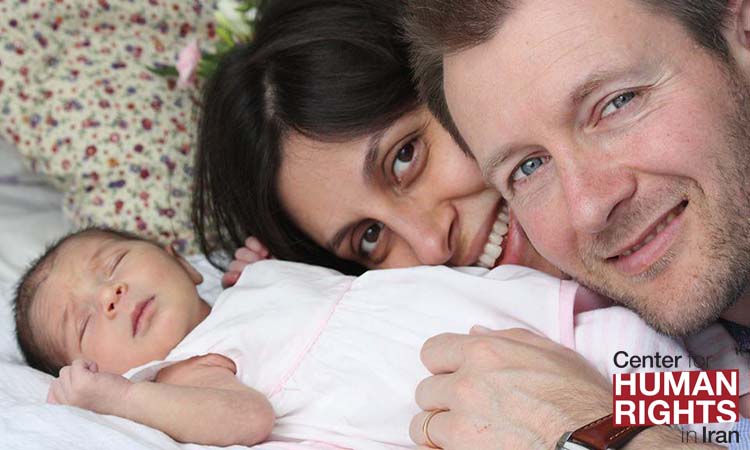
Gabriella was so young when she was separated from her mother. How have they been faring?
Gabriella was 22-months-old when they were separated and Nazanin had only just finished breast-feeding her at that point, so before her arrest, they had not been outside of each other’s company—just once, for one day. So that first 45 days where they didn’t get to see each other were deeply traumatic for Nazanin in particular and for Gabriella as well and she certainly would have been waking up in the night crying, calling out for mummy.
Back then Gabriella couldn’t speak Farsi or English, so her ability to communicate was very limited, but at least she knew her granny. Her grandma has been looking after her for the past year and a half now—so half of Gabriella’s life now. Gabriella has been calling her granny “maman,” so in a way, her grandmother has become her mother figure and that has been very hard for Nazanin. Having her baby taken away from her has been like having part of her ripped away.
So now Gabriella’s a little Iranian baby. She’s three and can speak Farsi fluently. She goes to nursery and she misses her mom, misses her dad, and does various things. She gets to visit Nazanin once a week, sometimes twice a week, and so those visits they’re coloring, and they’re discovering nice things to do as mother and daughter.
Three-year-old Gabriella goes to Evin Prison once a week?
Yes. Before she used to talk about prison as being mommy’s bedroom. And now she knows it’s Evin Prison and there are other children there she gets to see and if someone asks her in the park where’s your mommy, she says she’s in prison and then her grandmother has to explain, no, she’s not in prison for the reason you think.
She knows she sees mommy in one place, and speaks to her daddy on the phone and in a different way. We’ve been separated now for 18 months and I maintain a relationship with Gabriella that is really around playing funny games with her and her dancing and Nazanin has a different way, which is around doing drawing together. So Gabriella will never dance in prison.
I can’t speak Farsi and Gabriella now kind of understands English, but she has essentially lost her English and so it gets translated to her on Skype. The visual games, like “boo” still work, and now she goes to a nursery and they speak English, so she has an Iranian accent. The English will come back, I hope.
So that was very hard for me when I realized that last summer, that she was understanding English less and less and was adapting to just Farsi.
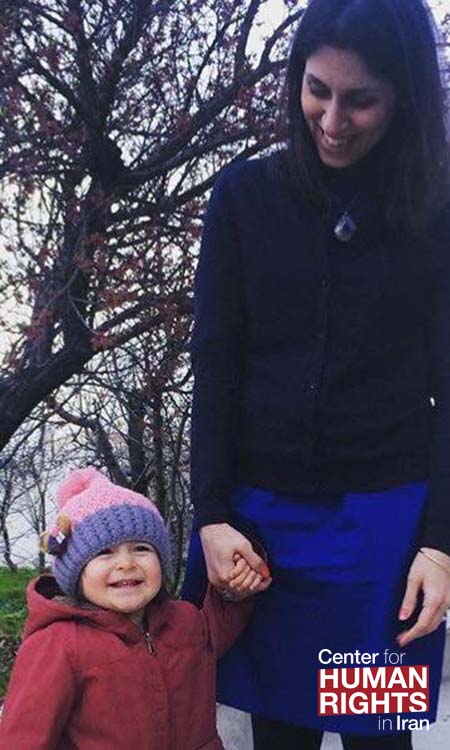 How is Nazanin’s health?
How is Nazanin’s health?
Her health has gone through phases. She went in perfectly healthy and at times has been in poor health as a consequence of her treatment. She was interrogated fairly ruthlessly for the first month, they went through her personal online accounts, email, Facebook. She works for a media charity, so they asked her about its operations. It wasn’t all day every day, but it would be for a few hours, and then you would be left alone.
She lost a lot of weight in that process, she lost 7 kilos; she was 52 when she went in and then dropped right down to 46, and clearly she was very traumatized. She was kept in a room without windows, not seeing anyone apart from her interrogators, if she cooperated, she would be allowed a phone call.
When she came out of solitary—she came out after we started campaigning—she couldn’t walk without blackouts. During family visits, she didn’t have the strength to stand; Gabriella had to be lifted onto her lap. And it took a long time for her family to share that with me, just how bad she was.
Obviously our understanding of her health was very sheltered at the time. And then I discovered she had been suicidal, that she had gone as far as writing a suicide note, and had gone on a hunger strike for five or six days in the Autumn of 2016. So her health was poor and desperate. And when she got moved out to the general cells, which was just after her appeal around Christmas time, there were a couple of weeks where she was okay, and then almost like a physical reaction to everything that had happened before, physically she seized up. She had neck and shoulder problems, and she had to just lie down due to the spasms. And she was just getting panic attacks and collapsed without any reason.
And then she was taken to see a neurological specialist who said she should be admitted to a hospital immediately and she wasn’t. That never happened. What happened in the end was she was given some physiotherapy. The referral was in February 2017, she started in April, and she got 20 sessions. She’s not perfect, but now she can do chores in the prison and move her hand.
She still goes up and down and its related to seeing Gabriella or not seeing her. It’s related to hope, of being promised things and seeing them taken away.
After a long time she was allowed to see an outside psychiatrist and has had a number of sessions outside of the prison and accepted some medication because she was getting fixated on the injustice, thinking that this will never end, and so that calmed her down a bit. Just recently, she has been going down again. I can always feel when she’s going down again, if I don’t do something to give her hope again, then we’re left in a dark place. There are scars there that will take time to heal.
What about you Richard? How have you been coping?
So all this has been a discovery, obviously, and a long journey, and it has gone through phases for me: shock, disbelief and disorientation. I didn’t do anything for the first couple of weeks, I just thought it would sort itself out. I thought, this is Iran, things like this happen, and she hasn’t done anything, so it will pass. And then for me the hard part was realizing I had done nothing while all of this was going on for Nazanin. I was unable to work, unable to sleep. But campaigning has been good for me. It has given me a way of telling her story, feeling like I’m doing something. It’s not campaigning as therapy, but it is effective.
I am sure campaigning is the best way to get her home. Her father’s not sure. We have tensions within the family. But campaigning is the only way we can say this is wrong, things have to change. Out of respect for Iran, I’m telling you [Iran], this is wrong. I’m not bluffing, I’m not lying and Nazanin should be immediately released.
The hard part about all this is that there is no roadmap. Different families struggle their way through it. You get different advice, even from within the same organizations. And it’s all a bit arbitrary. Even why it started, and why it will end. But I learned to go with my gut instinct, to listen to people but go with my instinct and keep mindful of what’s important for Nazanin now and in the future, and the rehabilitation. What’s important is the rehabilitation.
What does Nazanin think about the charges against her?
Legally, she has never had charges presented to her, but they are national security related-issues. My understanding is that she was imprisoned for working for the Thomson Reuters Foundation’s charity and before she worked for a different one, which was BBC Media Action. That translated into “membership in organizations working against the state.”
She always thought it was nonsense. The truth is she was in Iran on holiday, and was taken. Now she feels a profound sense of injustice. Many Iranians want to just be normal, to go visit their family, and be proud of Iran, of all it is and all it could be. And she was sort of hopeful about the nuclear deal, thinking everyone can finally see what a great country Iran is. So there is bitterness really, like, ‘how can you pick me out and create all these lies.’ This is not the country I was proud of, the country that I wanted to show to my daughter, my husband, and my in-laws. And then there is the personal part, how can you keep me away from my daughter for so long? You know this is wrong. The whole world can see what you’re doing.
And Nazanin was not political. You always have the illusion that people who get into trouble are in politics, and you believe that if you don’t get involved in politics, you’re safe. And that’s not true. People have always said there’s no smoke without fire, and they turned to crazy theories. And she really was just there on holiday, and wanted to show off Gabriella to her family in Iran. That was the purpose of going there. Before all this happened, we were talking about going to live in Iran for years. And that has all been taken away.


